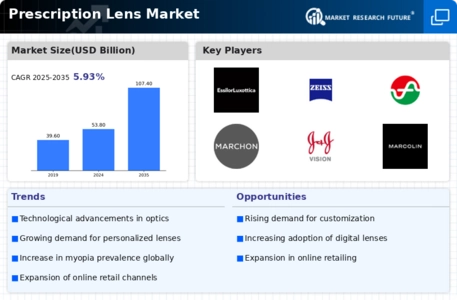Growing Awareness of Eye Health
There is a notable increase in awareness regarding eye health and the importance of regular eye examinations, which significantly impacts the Global Prescription Lens Market Industry. Educational campaigns and initiatives by health organizations are encouraging individuals to prioritize their vision care. As a result, more people are seeking professional eye care services, leading to a higher demand for prescription lenses. This trend is expected to drive the market's growth, with projections indicating a potential market size of 107.4 USD Billion by 2035. The emphasis on preventive care and early detection of vision issues is reshaping consumer behavior in favor of corrective eyewear.
Expansion of E-commerce Platforms
The rise of e-commerce platforms is reshaping the Global Prescription Lens Market Industry by providing consumers with convenient access to a wide range of eyewear options. Online retailers are increasingly offering virtual try-on technologies, allowing customers to visualize how different lenses will look before making a purchase. This shift towards online shopping is particularly appealing to younger demographics who prefer the convenience of purchasing eyewear from home. As e-commerce continues to expand, it is likely to contribute significantly to market growth, facilitating easier access to prescription lenses and enhancing overall consumer experience.
Rising Prevalence of Vision Disorders
The increasing incidence of vision disorders globally appears to be a primary driver for the Global Prescription Lens Market Industry. With an estimated 2.7 billion people projected to require vision correction by 2024, the demand for prescription lenses is expected to surge. This trend is particularly evident in regions with aging populations, where conditions such as presbyopia and myopia are prevalent. As a result, the market is anticipated to reach a valuation of 53.8 USD Billion in 2024, reflecting a growing need for corrective eyewear. The Global Prescription Lens Market Industry is thus positioned to expand significantly in response to these demographic shifts.
Increased Investment in Research and Development
Investment in research and development within the Global Prescription Lens Market Industry is fostering innovation and enhancing product offerings. Companies are focusing on developing new materials and coatings that improve lens durability, scratch resistance, and UV protection. This commitment to R&D not only enhances product quality but also addresses evolving consumer preferences for advanced features in eyewear. As a result, the market is expected to benefit from a steady influx of innovative products, further driving consumer interest and sales. This focus on R&D is likely to play a crucial role in sustaining the industry's growth trajectory.
Technological Advancements in Lens Manufacturing
Technological innovations in lens manufacturing are transforming the Global Prescription Lens Market Industry. Advancements such as digital surfacing technology and high-definition lenses enhance optical performance and comfort for users. These innovations not only improve the quality of vision correction but also cater to the diverse needs of consumers, including those requiring specialized lenses for specific activities. As the market embraces these technologies, it is likely to attract a broader customer base, contributing to an anticipated growth rate of 6.49% CAGR from 2025 to 2035. This evolution in manufacturing processes underscores the industry's commitment to meeting consumer demands.





















